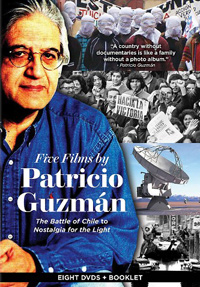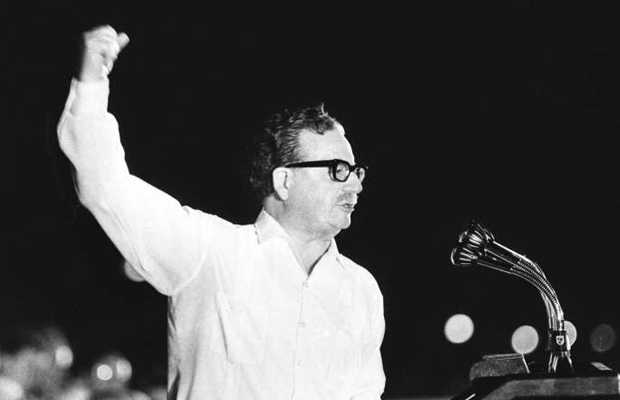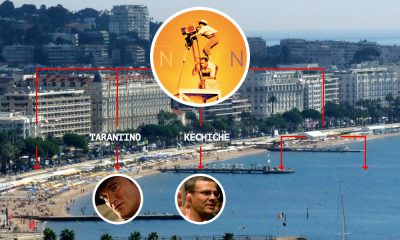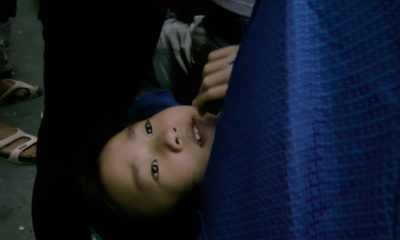Reviews
Five Films by Patricio Guzmán | DVD Review
 As Patricio Guzman’s latest documentary The Pearl Button, which premiered at the 2015 Berlin Film Festival, completes its festival circuit rounds, a comprehensive box set of the famed Chilean documentarian’s most iconic works arrives on DVD. One of the world’s most noted masters of the medium, Guzman’s works provide an invaluable framework of his country’s violent past following the socialist revolution and violent coup which resulted in seventeen years of a harsh and violent dictatorship under the rule of Augusto Pinochet. Beginning with the three part saga The Battle of Chile, this eight disc set includes all of his most notable major historical and political documentaries through 2011’s Nostalgia for the Light. Though the collection is not a complete account of Guzman’s filmography, it’s a thematic distillation of a country’s harrowing history, and Guzman’s footage evolves from an initial priceless account of severe political upheaval to passionate and poetic examinations in the aftermath of the following decades.
As Patricio Guzman’s latest documentary The Pearl Button, which premiered at the 2015 Berlin Film Festival, completes its festival circuit rounds, a comprehensive box set of the famed Chilean documentarian’s most iconic works arrives on DVD. One of the world’s most noted masters of the medium, Guzman’s works provide an invaluable framework of his country’s violent past following the socialist revolution and violent coup which resulted in seventeen years of a harsh and violent dictatorship under the rule of Augusto Pinochet. Beginning with the three part saga The Battle of Chile, this eight disc set includes all of his most notable major historical and political documentaries through 2011’s Nostalgia for the Light. Though the collection is not a complete account of Guzman’s filmography, it’s a thematic distillation of a country’s harrowing history, and Guzman’s footage evolves from an initial priceless account of severe political upheaval to passionate and poetic examinations in the aftermath of the following decades.
The Battle of Chile (1975-1978):
Patricio Guzman’s landmark documentary, one of the most important chronicles captured on film, is The Battle of Chile, a near five hour saga (completed during his exile in Spain) capturing the peaceful social revolution which led to the election of President Salvador Allende in 1970, and the eventual coup d’état which ended with the leader’s death and the assumption of power by General Augusto Pinochet. Part One, The Insurrection of the Bourgeoisie, ‘the struggle of an unarmed people,’ recounts the growing restlessness and mounting political tension between the PU (Popular Unity), the working class group of Communists and other social groups supporting Allende, and the Christian Democrats. Allende managed to nationalize many of the nation’s larger industries. However, this socialist program eventually had several consequences, including a plummeting economy, which upset US interests in Chile’s political arena, leading secret operatives and a large amount of US money towards the destabilization of Allende’s government, which led to the infamous coup d’état on September 11, 1973. The segment ends when one of Guzman’s camera men gets shot to death on film by a member of the Chilean military.
Part Two, The Coup D’état, picks up in June of 1973, with the attempted military coup. More profuse amounts of footage unspool as Guzman narrates, injecting his own political views into a historical play-by-play. Some may be rankled by his objective statements, particularly in the continually rosy aura Guzman builds around Allende as a figure in his lengthy passages of narration.
Part Three, The Power of the People, was spliced together and saw initial release in 1979. Guzman focuses on the working class attitudes of the PU and how this played into and was affected by the coup d’état. Starting in Santiago, 1972, Guzman inserts several instances of television footage amidst a wide variety of emotional outbursts. Of the three segments of the documentary, it feels the least potent considering the ground covered in earlier segments leading up to the country’s devastating turning point.
Chile, Obstinate Memory (1997):
After Pinochet ceded presidential power in 1990 (see Pablo Larrain’s 2012 No for an explanatory narrative angle), Guzman returned from exile to his native country, an experience he documented. This became the hour long Chile, Obstinate Memory, wherein Guzman brings his banned The Battle of Chile to show to a shocked generation of kids who grew up listening to fabrications of the 1973 coup. Much like Germany in the decade following WWII, the Chilean citizens seems resistant to wanting to remember the atrocities of the past, an apathy and ignorance Guzman clearly is committed to conquering. The documentary feels very much like the first stage of a healing process, as if the first actions taken to correct an improperly healed bone are being administered. Beginning with Allende’s assassination in 1973, Guzman charts a course of rough facts and how he presents them to a variety of professionals who speak their opinion about a future for the country, as well as getting initial reactions from students suddenly learning about the devastation the country’s come out of.
The Pinochet Case (2001):
Guzman continues to capture history as it happens with this emotional documentary detailing the arrest and struggle to extradite Augusto Pinochet in 1998 while he underwent a surgery in London. The Spanish Supreme Court had ruled Pinochet’s crimes against humanity, involving the torture and execution of Spanish citizens in Chile, allowed for him to be tried in any court in the world. Back and forth stipulations about immunity afforded heads and ex-heads of state, along with Pinochet’s declining health exacerbates the intense situation. In between feeding us details on the eventual return of Pinochet to Chile (including footage of Margaret Thatcher visiting Pinochet while under house arrest in London, praising his help in the assistance of Britain’s Falkland Island campaign as she coos about how Pinochet brought democracy to Chile), Guzman interviews a wide variety of survivors. These private testimonials are incredibly candid, many of these from women held in Villa Grimaldi, and their inclusion usurps almost everything Guzman already managed to put on film prior (eerily, many of these confessions echo the torture memories of Ariel Dorfman’s play Death and the Maiden, filmed by Roman Polanski in 1994).
Salvador Allende (2004):
Guzman’s focus of this 2004 film is specifically socialist president Salvador Allende. Beginning in 1970 Chile, Guzman gives a brief overview of Allende’s ascension, including his youth in Valparaiso. Black and white footage is mixed with modern interviews from subjects still alive, and Guzman captures the great reluctance of anyone to speak on Allende in front of the camera. Allende’s daughter, novelist Isabel Allende, is also on hand for a brief period, while it’s clear many of the leader’s staunch supporters are still quite emotional about his death, as some state, “When Allende died, everything died.” Compared to the previous titles, Salvador Allende feels like more of rehash of material Guzman had already extensively covered, particularly in the much more succinct 1997 title, Chile, Obstinate Memory.
Nostalgia for the Light (2010):
Guzman manages to distill all the bitterness, righteousness, and pointed anger evident in his development as a filmmaker and funnel it into what stands as his most achingly rendered film, Nostalgia for the Light. As astronomers in Chile’s Atacama Desert utilize the region’s unique placement to peer deep into the cosmos, a band of tireless women scour the desert for the remains of bodies that had been dumped into the sand during Pinochet’s dictatorship. The importance of studying and remembering the past is tantamount to both groups of people, and they’re aligned and juxtaposed in increasingly poetic ways. Splicing startling imagery of bone shards amidst various spatial entities and visions of the cosmos as seen through the magnificent apparatuses available to view them, it’s a film that’s as visionary as it is tied to the same subjects of Guzman’s past work. DoP Katell Djian (who returned to work on The Pearl Button, a film of similar beauty) does stunning work here in this deliberation of the cosmos as filtered through the eyepiece of devastating manmade tragedy.
Disc Review:
A notable collection of Patricio Guzman’s filmography, this five title selection from Icarus Films is a great place to catch up with him if you’ve missed anything. Though it would’ve been great to see these get a Blu-ray option, it’s obvious much thought went into the packaging (although a misprint on the label of Disc 2 is unfortunate). This is an eight disc set, thanks to a disc devoted to each section of The Battle of Chile plus a whole disc devoted to a 2014 documentary about Guzman from filmmaker Boris Nicot, available for the first time on disc.
Bonus Features:
Filming Obstinately, Meeting Patricio Guzman (Disc 8):
Filmmaker Boris Nicot (whose essay also appears in the collection’s 24 page booklet insert) directs this 98 minute feature on Guzman. The documentarian is interviewed and filmed as he works, guising us through his methods as well as particular moments in his filmography.
Guzman Interview (on Disc 4):
Film critic and essayist Jose Carlos Avellar interviews Guzman in this twenty minute segment, which jumps right in to Guzman remembering his film student days prior to the political situation of Chile and Salvador Allende. His filmmaking process, which began as an effort to capture as much as possible he terms a ‘communal infatuation.’
Five Short Films by Guzman (Disc 7):
Totaling 81 minutes, five of Guzman’s short films are included here for your enjoyment. All from 2010 and concerned with astronomical subjects, they are as follows: “Chile, a Galaxy of Problems,” “Oscar Saa, Technician of the Stars,” “Jose Maza, Sky Traveler,” “Maria Teresa and the Brown Dwarf,” and “Astronomers From My Neighborhood.”
Final Thoughts:
Guzman’s filmography offers an extensive record of revolution, counter revolution, and the horrendous crimes against humanity that would follow. Those unfamiliar with Chile’s legacy of terror should find this introduction to Guzman’s work enlightening, but it’s a significant package of an important historical saga. Recently, fellow Chilean auteur Pablo Larrain has formatted the Pinochet dictatorship into his own narrative trilogy of films, titles which also owe a significant debt to Guzman’s fearless documentaries.
Films Reviews:
The Battle of Chile: ★★★★/☆☆☆☆☆
Chile, Obstinate Memory: ★★★/☆☆☆☆☆
The Pinochet Case: ★★★½/☆☆☆☆☆
Salvador Allende: ★★½/☆☆☆☆☆
Nostalgia for the Light: ★★★★/☆☆☆☆☆
Disc Set Review: ★★★/☆☆☆☆☆
Los Angeles based Nicholas Bell is IONCINEMA.com's Chief Film Critic and covers film festivals such as Sundance, Berlin, Cannes and TIFF. He is part of the critic groups on Rotten Tomatoes, The Los Angeles Film Critics Association (LAFCA), the Online Film Critics Society (OFCS) and GALECA. His top 3 for 2021: France (Bruno Dumont), Passing (Rebecca Hall) and Nightmare Alley (Guillermo Del Toro). He was a jury member at the 2019 Cleveland International Film Festival.
































